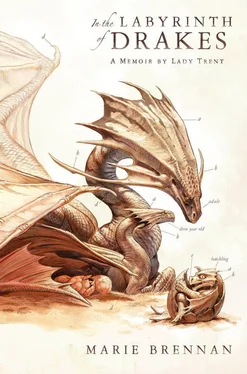Tom and I descended the stairs and went out into the bustling streets of Drawbury, which in those days still held the headquarters of the Royal Army in Falchester. We stood for a moment in silence, watching people go by; then, as if by a silent accord, we turned to regard one another.
“Akhia,” Tom said, a grin touching his expression.
“Indeed.” I knew why his grin had not fully come to rest. My own excitement was tempered with apprehension. Our research aboard the Basilisk had been carried out partially under the auspices of other groups—the Scirling Geographical Association, the Ornithological Society—but that was quite different from the kind of oversight that now loomed over us.
I would never say it to Tom, who had fought so hard for my inclusion in this enterprise, but I was not entirely sanguine about the prospect of working for the Royal Army. My adventures abroad had tangled me in such affairs on several occasions, but I had never sought them out deliberately before now. And I knew very well that if we succeeded in breeding dragons as the Crown desired, we would in effect be reducing them to the status of livestock: creatures fed and raised to adulthood in captivity, only so they could be slaughtered for human benefit.
The alternative, however, was worse. If dragons could not be bred, then they would only be hunted; the wild populations would be depleted in short order. I had grown up in the countryside, where the slaughter of sheep and fowl was entirely commonplace. I must persuade myself to think of the dragons in those terms—however difficult such thoughts might be.
Tom and I walked to the corner of Rafter Street, where a hansom cab might be hailed. By that point in my life I had enough money to maintain a carriage of my own if I wished, but I had gotten out of the habit. (My friends later had to persuade me that while Mrs. Camherst or Dame Isabella might do as she wished, it was not fitting for Lady Trent to go about in hired vehicles.) Once settled in and on our way, Tom caught my gaze and asked, “Will you look for him?”
There was no point in pretending I did not know who Tom was talking about. There was little more in pretending carelessness, but I did my best—more for the sake of my own dignity than out of any hope of deceiving Tom. “I doubt I could find him if I tried,” I said, gazing out the window at the city rattling past. “There must be a great many men in Akhia named Suhail.”
Our erstwhile companion from the Basilisk, the man who had gone with me to the cursed isle of Rahuahane, who had stolen a Yelangese caeliger and tried to rescue a princess. I had given him my direction in Falchester before we parted company in Phetayong, but had not received a single letter in the nearly three years since. Possibly he had lost the notebook page upon which I scrawled the information. But it was not so difficult to find me; there were few lady dragon naturalists in the world, and only one named Isabella Camherst.
My words were a mask for that sorrow, but also a nod to the truth. As well as I thought I knew Suhail, I knew very little about him: not his father’s name, not his family name, not even the city in which he lived.
As if he could hear those thoughts, Tom said, “I imagine the population of archaeologists named Suhail is rather smaller.”
“Presuming he still engages in such work,” I said with a sigh. “I had the distinct impression that his father’s death meant he was being called home to his duties. He may have been forced to lay aside his own interests.”
Although I meant my comment to be temperate, the word “forced” betrayed my own feelings. I had once forsworn all my customary interests for the sake of my family; the “grey years,” as I called them, had been one of the dreariest periods of my life—surpassed only by the time spent mourning my husband Jacob. I knew Suhail’s passion for his work; I could not imagine him giving it up without a qualm.
“You could ask around,” Tom said gently. “What harm could there be?”
Embarrassment for Suhail’s family, perhaps—but having never met them, knowing nothing of them, I found it hard to muster much concern for their feelings. And yet, I did not want to get my own hopes up, only to see them dashed. “Perhaps,” I said. Tom was kind enough to let me leave it at that.
* * *
I did not have much leisure for melancholy after I returned to my Hart Square townhouse. If we were to leave in a week and a half, there was no time to lose. I sent the maid to begin an inventory of my travel wardrobe, and went into my study to consider which books I would bring along.
My study had, over the years, become a source of deep and quiet pleasure to me. It was not elegant, as some gentlemen’s studies are; one might rather call it “cluttered.” Apart from the books, I had notes, maps, sketches and finished paintings, field specimens, and assorted knick-knacks collected in my travels. Shells acquired by my son Jake weighed down stacks of paper; the replica of the egg I had taken from Rahuahane propped up a shelf of books. (The firestone carved out of the albumen of the real egg was still mostly hidden atop my wardrobe, although I had shaped a few of the pieces and sold them for funds along the way.) High on the wall, above the shelves, a series of plaster cast footprints marched in an unsteady line: the fossilized tracks of a prehistoric dragon, discovered the year before by Konrad Vigfusson in southern Otholé.
A large claw sat on my desk, where I had left it that morning. The claw was a complete mystery, sent to me by a fossil-hunter in Isnats; he guessed its age to be tens of thousands of years old, if not more. It was a fascinating glimpse into the distant past of dragons… presuming, of course, that the claw did indeed come from a dragon. The fossil-hunter had found no associated bones, which would ordinarily aid in classifying a specimen. In this instance, the lack of bones might be the identifier: if the owner of the claw had been a “true” dragon, then of course its bones would have decayed too rapidly for fossilization. (Although preservation can occur in nature, the chemical conditions for it are sufficiently rare as to make fossil dragon bones nearly unknown—although a great many hucksters and confidence men would have you believe otherwise.)
So: grant that it may have been a dragon. If so, then it was one of prodigious size, dwarfing even the largest breeds known today, as the claw measured nearly thirty centimeters around the curve from base to tip. Tom theorized that the claw might have been out of proportion to the rest of the dragon, which certainly made biological sense; what the purpose of such an overgrown talon might have been, however, is still a puzzle today. Hunting, defense, the attraction of mates… we have many guesses, but no facts.
My study also contained a box, high up on one shelf, whose battered exterior suggested that nothing of particular interest was contained therein. Unknown to any but Tom and myself, it held my greatest treasure.
This I lifted down, after first ensuring my door was locked. Shorn of its lid, it disclosed various plaster lumps held together with bits of wire. This, as readers of the previous volume may recall, was the cast I had taken of the gaps inside the Rahuahane egg—the emptiness where once an embryo had been.
The cast, unfortunately, was far too delicate to risk on a sea journey to Akhia, and as near to irreplaceable as made no difference. I had studied it a hundred times and drawn its appearance from every angle; the sketches I could take with me. Nothing replaced the experience of looking at it directly, though, and so I examined it one last time, fixing its shape in my mind.
I believed—but could not yet prove—that it constituted evidence of a lost breed of dragon, one which the ancient Draconeans had indeed tamed, as the legends said. Those legends had always been doubtful, owing to the intractability of most dragon types, but a breed now lost to us might have been more cooperative. Indeed, I sometimes wondered if that cooperative nature was why the breed was lost: we have so thoroughly domesticated certain kinds of dogs that they can no longer survive in the wild. If the Draconeans had developed such a creature, it might well have died out after the collapse of their civilization.
Читать дальше












